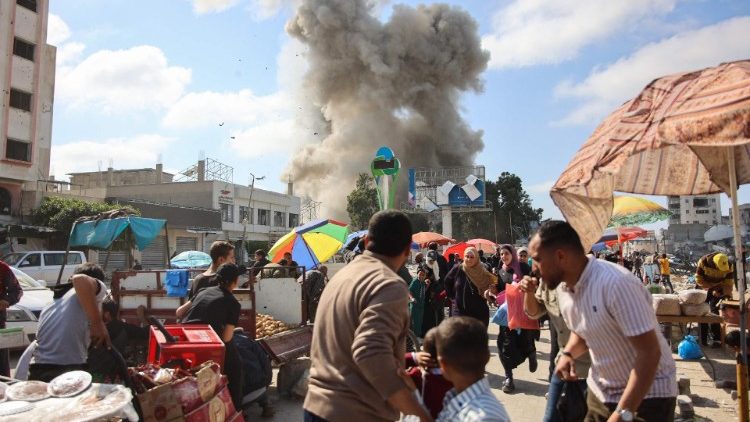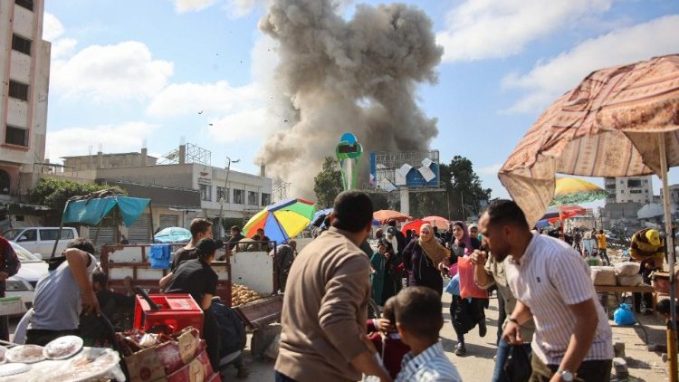Pope: Stop the war in the Middle East, don’t allow it to spread
In a message to Muslims for the conclusion of Ramadan, Pope Francis shares his desire for peace in Palestine, Israel, Syria and Lebanon and appeals to all men and women of goodwill to not “allow the flames of resentment, driven by the ominous...



In a message to Muslims for the conclusion of Ramadan, Pope Francis shares his desire for peace in Palestine, Israel, Syria and Lebanon and appeals to all men and women of goodwill to not “allow the flames of resentment, driven by the ominous winds of the arms race, to flare up”, calling on leaders to stop the fighting and prevent a possible spread of the war.
By Linda Bordoni
In a message marking the end of Ramadan, the month observed by Muslims as one of fasting, prayer, reflection and community, Pope Francis shared his distress for the ongoing war in Israel and Palestine and the violence in Syria, Lebanon and throughout the region, reiterating his belief that “war is always and only a failure: a road leading nowhere” that stifles all hope.
The Pope’s greetings to his Muslim brothers and sisters were accompanied by words of sadness for “for the blood presently being shed in the blessed lands of the Middle East”, in a letter, on 12 April, addressed to the Al Arabiya international Arabic news television channel.
Noting that the end of the sacred Islamic month of Ramadan concluded this year shortly after the celebration of Easter, he observed that both occasions lead believers to raise their eyes to heaven and “to worship the Lord ‘merciful and almighty”’ in stark contrast with the devastation caused by missiles devastating the earth.
God is peace and desires peace
“God is peace and He desires peace. Those who believe in Him cannot fail to repudiate war, which does not resolve but only increases hostilities,” Pope Francis wrote, reiterating his belief that “War is always and only a failure: it is a road leading nowhere; it does not open new vistas but stifles all hope.”
Expressing his anguish for the conflict in Palestine and Israel, he repeated his appeal for an immediate ceasefire in the Gaza Strip, where, he said, a humanitarian catastrophe is unfolding.
“May aid be allowed to reach the Palestinian people who are suffering greatly, and may the hostages taken in October be released!”
Appeal for entire Middle East
The Holy Father continued with thoughts for “war-torn Syria, Lebanon, and the entire Middle East.”
“Let us not allow the flames of resentment to spread, fanned by the baleful winds of the arms race! Let us not allow war to spread! Let us put an end to the inertia of evil!”
The Pope said he thinks of the families, the youth, the workers, the elderly, and the children and is certain that in their hearts, “in the hearts of ordinary people, there is a great desire for peace.”
“Amid the spread of violence, tears flow from their eyes and a single word issues from their lips: ‘Enough’.”
I myself repeat ‘Enough!’ Pope Francis said, directing his words to “those who bear the grave responsibility of governing nations: Enough! Stop!“
“Please, put an end to the clash of arms and think of the children, all the children, as you do your own children” he said, inviting them to look to the future with the eyes of children who “do not ask who is the enemy to be destroyed, but who are the friends with whom they can play. They need homes, parks and schools, not tombs and mass graves.”
Right of every people to have their own State
The Holy Father concluded his letter with words of hope and the belief that just as deserts can flower, so can the hearts of people and the lives of nations.
He warned against “deserts of hatred” noting that “shoots of hope only if we learn how to grow together, one alongside the other; only if we learn to respect the beliefs of others; only if we recognize the right to existence of every people and the right of every people to have their own State; only if we learn how to live in peace without demonizing anyone.”
Finally, he had words of closeness and encouragement for the Christians who live in the Middle East “amid not a few difficulties,” asking that they “enjoy always and everywhere have the right and the ability to profess freely their faith, which speaks of peace and fraternity.”
















